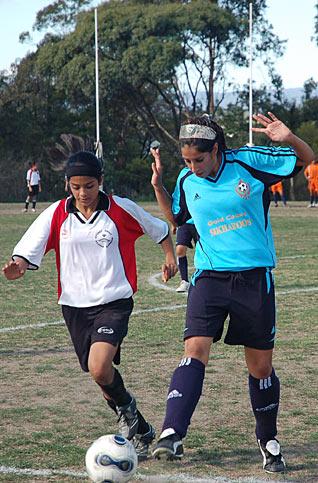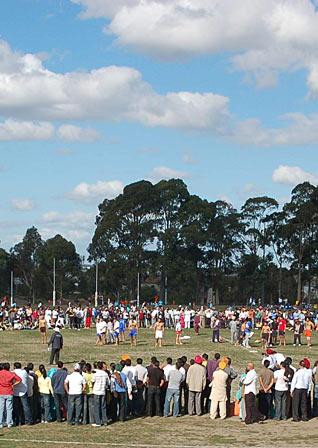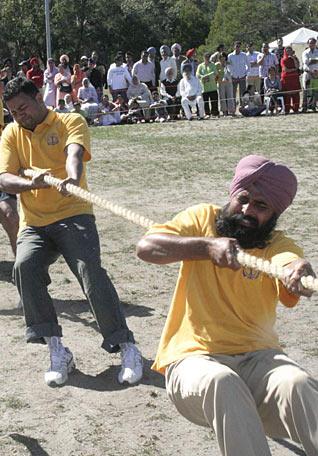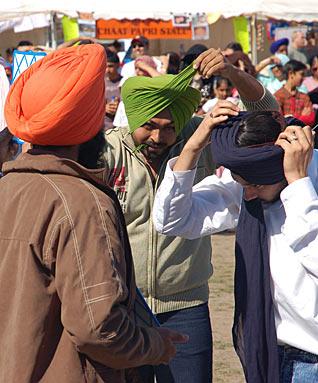Columnists
Australia's National Sikh Games
by MANPREET KAUR SINGHFor three days in April, you could be forgiven for thinking you weren't actually living in Melbourne, Australia, but in some laid-back village of Punjab instead.
The elite Monash University grounds had been transformed into a typical pind staging a mela of a lifetime, and anyone who entered the premises was instantly transported to Punjab - without getting an airline ticket or visa, of course!
But the fun and frolic, the phulkaris, the food and the music were just a sideshow to the main event, which had serious sporting competitions in about 16 disciplines, with over 1000 competitors vying for the top spots.
That is a snapshot of the 20th National Sikh Games which were held in Melbourne this year, with participants hailing from metro cities like Sydney, Melbourne, Brisbane, Adelaide and Perth, as well as outback towns like Shepparton, Griffith, Woolgoolga and Renmark. To give the competition an international flavour, there were teams from New Zealand, Singapore and Malaysia, too.
Although teams from the UK and Hong Kong have made it to the previous Games, their absence was marked but didn't mar the overall festivity of the Melbourne Games.
Traditionally, the National Sikh Games are held over the Easter holiday period in Australia, ensuring maximum participation all way around.
Says Satnam Singh Pabla of Singh Sabha Sports Club, the organizing body in Melbourne: "I think we had around 10,000 people attending every day. The community really rallied together to provide free langar to everyone and the spirit was just unbelievable."
And this is what sets these games apart from anything else in Australia, or perhaps even the world. For all the three days, there was free food served to thousands of people - to competitors and spectators alike - something inconceivable to local Australians.
"You're joking, aren't you", said one, when she was told that the food, tea, fruit and drinks being served round the clock were all for free!
Of course, there were umpteen stalls where you could buy anything from makki di roti and sarson da saag, papri chaat, kulfi and kanji to Amritsari fish, pakorey and tandoori chicken. And you could buy suits and lehngas, bangles and jewellery, and traditional artefacts.
Then there was a pugri-tying competition, live performances, gatka shows and a three-day forum on history, philosophy and modern-day issues pertaining to Sikhism.
To cap it all, there was a special music concert by singer Balkar Singh Sidhu, who came specially from India, and the atmosphere echoed with chak de phattey all the way through.
But the Australian Sikh Games weren't always such a grand affair. They had a humble beginning in 1988 when five hockey teams decided to have an interstate competition - four teams hailed from the hometown, Adelaide, and a team from Melbourne was invited to join. Alongside, a Sikh forum was held and the day culminated with a dinner and dance.
The games have come a long way since then, and no one is happier than Mahanbir Singh Grewal of Port Augusta (South Australia), who played in the original game in 1988 and is now the President of the Australian National Sikh Sports and Cultural Council (ANSSCC), the body that oversees the Games.
Says Grewal, "I am overwhelmed by the public response to these Games. For something that started as a mere hockey competition between teams from two cities, it has snowballed into a massive celebration of sports, culture and tradition."
The Melbourne 2007 Games had competitions in soccer, volleyball, tennis, kabbaddi, tug-of-war, wrestling, badminton, golf and netball, to name a few, for both men and women from junior to senior levels.
Soccer was by far the favourite sport for competitors, with thirty different teams participating.
But kabbaddi was the crowds' delight, with thousands of spectators watching duels throughout the day. In typical Punjabi style, the announcers describing the matches were more stand-up comedians than commentators, making the whole atmosphere even more enjoyable.
Gurcharan Singh Bakshi, a visitor from India, visiting his son in Melbourne, exclaimed: "I don't think I would have seen this in Delhi, the city where I come from. The last time I saw a live kabbaddi match and heard such commentary was decades ago in Punjab, and isn't it funny that I had to come to Melbourne to relive those memories again."
An added treat for the spectators were some exhibition wrestling matches with noted Indian wrestlers. Perchance, a Punjab Police wrestling team recently came to Melbourne for a competition and the Australian Sikh Games organizers persuaded them to stay on for the Melbourne 2007 Games as well. Luckily they could, so the audience was treated to superb wrestling duels from the top echelon of Indian competitors.
Although most of the participants in the Games were Sikh - it is an eligibility requirement that at least one parent of the competitor be Sikh - it was nice to see some participation from the wider Australian community, as well. The constitution of the Games allows for a team to include some members from non-Sikh backgrounds as long as the overall majority of the team still complies with the eligibility requirements. So there were some Chinese and other non-Sikh Australian participants as well, especially in the girls' soccer teams.
Jasbir Singh Randhawa of Sydney, who has been involved with the Games since 1993 and led the Sydney contingent to Melbourne this year, declares: "It's my greatest joy to see the Games in their 20th year now and growing. Although we can't compare the size of the Sikh presence in Australia to that of Canada and the UK, but I daresay that considering the number of events we hold over three days and the variety of competitions, these must be the biggest Games of their kind in the world."
But the Games are more than just a celebration of sport.
Randhawa explains: "These Games are unique since they provide an opportunity for all Sikhs and Punjabis to come together every year. People network here, enjoy the cultural interaction and meet old friends. I have friends in Malaysia and Singapore, and many from Perth and Adelaide, who I only meet annually during the Games. Moreover, the Games encourage our youth to participate in sport, something that we really value as Australians."
14-year-old Rana Tejwant Singh of Sydney agrees. "I participated in the Games for the first time this year and it was just fantastic. I had played on the boy's kabbaddi teams in Sydney before, but just by coming to these Games, I've learnt so much - how to grab, how to tackle, little things that really make a difference. I loved the experience and will definitely participate in the Perth Games next year."
Seeing increasing participation from youth is most satisfying for Mahanbir Singh. "This year for the first time, a lot of youngsters were involved in organizing the games as well, and that was really heartening for me. It just means that the Games have a great future and we can pass the legacy on to the next generation."
Another highlight of the Melbourne 2007 Games was the cultural competition, which was organized for the first time ever. Four gidda teams - from Sydney, Brisbane, New Zealand and Melbourne - competed against each other for the prize, as did eight bhangra teams from the same cities.
A regular spectator, Rajwant Singh, said, "For me, the cultural night was the highlight, since this was missing from the previous Games. I enjoyed all the performances and it only enhanced the family atmosphere for all of us."
So, while all Sikh-Australians are still talking about the Melbourne Games, the Perth chapter of ANSSCC is well into its preparations for the 21st Games to be held there in March 2008.
Such is the magnitude of these Games now that it took years of planning and a generous budget of over A$250,000 (nearly Rs 1 crore) to stage the Melbourne Games. Most of it came from corporate sponsorships and community donations.
But, according to Grewal, "The cost of hosting the Games has really blown out. Although we are all excited by the size of the Games now, there are problems associated with growth and we need to handle things delicately. It's important for us to maintain the momentum and make sure that the Games don't ever die away."
There are calls from some quarters to "internationalize" the Games and have more visiting teams from other countries.
As Aussie Sikhs savour and reflect on the lasting memories of the Melbourne 2007 Games, they also hope that the Perth Games are bigger and better in 2008 - and all the future Games are grander in scale.
Whether more sports are added to the list of competitions or not, whether more international teams participate or not, these Games have brought a lot of joy, communal festivity, competitive spirit and Punjabi tradition to many Australian cities.
So whatever happens in the future, one thing seems assured - kabbaddi, gatka, bhangra and gidda have found a permanent home in Australia and will always go hand in hand with other modern-day competitive sports for the Sikhs settled here.
[Courtesy: India Today]
Conversation about this article
1: Diljit Bahra (United Kingdom), August 13, 2008, 4:48 AM.
Excellent article - well done. Can someone tell me please if a Sikh has represented either Australia or New Zealand at hockey? Info for my website (www.sikhhockeyolympians.com) where I am keeping a record of every country a Sikh has represented in hockey. Thirteen, so far ...
2: Con Founten (Adelaide, South Australia ), July 25, 2010, 11:19 PM.
Will there be games in 2010 or 2011? Where and when? Are there any organizers I can contact?
3: Taranjeet Singh (Kuala Lumpur, Malaysia), September 17, 2010, 3:20 AM.
I would like to know how to get in touch with the contact person for the 2011 Australian Sikh Games in Adelaide.
4: Pal (Adelaide, Australia), September 20, 2010, 8:42 PM.
Where in Adelaide are the Sikh games going to be held?
5: Munjeet Singh Badesha (Sydney, Australia), October 21, 2010, 5:45 AM.
Could anyone please let me know whom to contact for registration of a team in the 2011 Sikh Games?
6: Mandeep Singh (Melbourne, Australia), November 26, 2010, 6:48 AM.
Can any one please tell me how to register my gatka team (Ranjeet Akhara, Melbourne) for the 2011 Sikh games?






